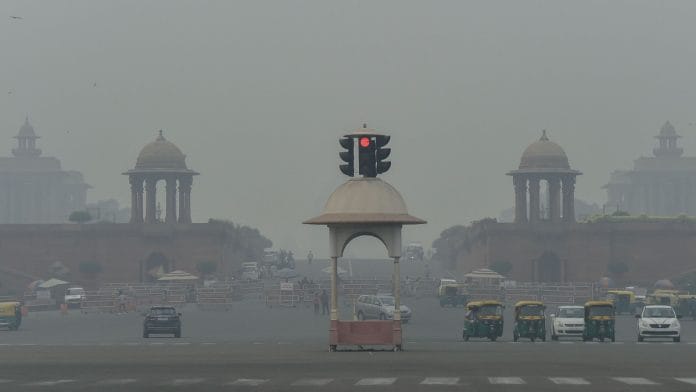New Delhi: The long-held belief that pollution is the cost a country has to pay for development is no longer true as bad air quality has a measurable detrimental impact on human productivity that could in turn reduce GDP, Canadian-American economist Alex Tabarrok said.
Speaking at a seminar in New Delhi Wednesday, Tabarrok quoted studies from different parts of the world to show that severe pollution has immediate effects on the productivity and performance of the workforce.
Recognising this effect and its implications on the economy will compel countries to take actions to mitigate pollution, said Tabarrok, who is a professor at the George Mason University in the US.
“There is this old story that pollution is bad, but it increases GDP… When the United States and Japan were developing, they were polluted. So India and China also have to go through that stage of pollution — so that they get rich, and then they can afford to reduce pollution,” Tabarrok said.
“I want to say that that story is wrong. What I want to argue is that a lot of the new research indicates that we may be in a situation where we could be both healthier and wealthier at the same time by reducing pollution,” he said.
Tabarrok added that pollution impacts health, productivity, cognition and human behaviour. “… in short, pollution is an attack on human capital. So at a time when countries are investing in increasing human capital, pollution is working against them.”
Also read: Modi govt allocates Rs 4,400 cr for cleaner air — big jump from Rs 460 cr in last budget
How to approach the issue
At the seminar, Tabarrok pointed out that expecting people to make sacrifices for the sake of future generations is not a politically fruitful way to deal with pollution.
Citing the issue of crop burning in India, he said farmers are not going to be inclined to change their behaviour if they are told to stop stubble burning for the sake of Delhi residents.
“However, if these farmers are made aware of how the crop burning harms them and their families and affects their soil quality, they are more likely to participate in mitigation measures,” he said.
According to him, poor understanding of the economic costs of pollutants is the reason behind the unsound government policies. “In Delhi, the odd-even policy is not in any way a solution which is appropriate to the scale and dimensions of the (pollution) problem.”
Tabarrok quoted a number of studies to show how pollution may have long term direct and indirect effects on workforce productivity.
The professor cited the example of a study by University of Southern California researchers conducted among call centre employees in China. It showed that productivity of the workers dropped on days when pollution levels were high.
Another study conducted among students in Israel showed that exposure to PM 2.5 led to a decline in their performance during an important exam that determined the course of their careers.
“Pollution, stunted growth, and decrease in productivity are current costs of climate change affecting the current generation. People need to be aware that this is not just going to affect future generations, but it is affecting children now,” added the economist.
Also read: ‘Airpocalypse’ — study says Modi govt should add 231 more cities to national clean air plan






